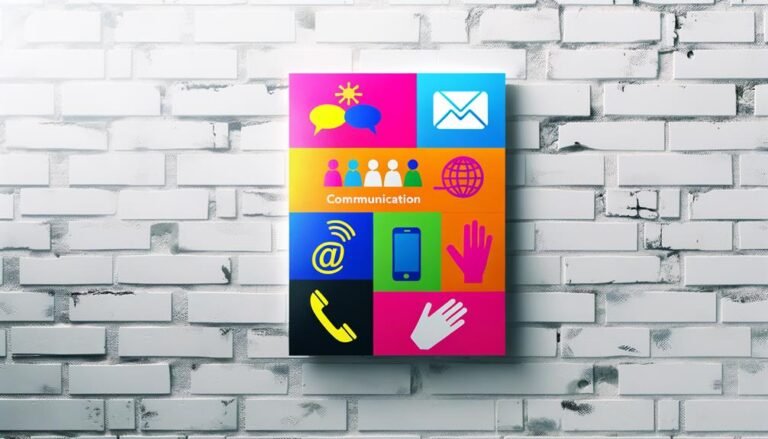Mindful Communication as a Soft Skill
Mastering mindful communication as a soft skill can revolutionize your relationships and professional interactions. Understanding the importance of self-awareness in communication allows for adjustments in your approach. Active listening shows respect and empathy, leading to better understanding. Implement practical tips like being fully present and summarizing to enhance your skills. Cultivating empathy through mindful communication involves focusing on others' perspectives and validating their feelings. This skill can elevate your interactions to new heights of collaboration and understanding. Ready to discover the full potential of mindful communication?
Key Takeaways
- Mindful communication enhances understanding and relationships.
- It fosters empathy and conflict resolution.
- Improves collaboration and problem-solving in professional settings.
- Active listening leads to increased productivity.
- Cultivating empathy through attentive communication is crucial for soft skills.
Importance of Mindful Communication
To truly connect with others and foster understanding, practicing mindful communication is essential. Increased self-awareness plays a pivotal role in mindful communication. When you're more aware of your thoughts, emotions, and reactions during conversations, you can better understand how they influence your communication style. This self-awareness allows you to adjust your approach, leading to more effective and meaningful interactions.
Moreover, improved listening skills are another key aspect of mindful communication. By actively listening to others without judgment or interruption, you demonstrate respect and empathy. This not only helps you understand the speaker's perspective more fully but also promotes a deeper connection. When you focus on truly listening instead of formulating your response while the other person is speaking, you create a space for genuine dialogue and mutual understanding to flourish.
Benefits in Personal Relationships
When cultivating mindful communication in personal relationships, you foster deeper connections and mutual understanding through active listening and self-awareness. By engaging in mindful communication, you create an environment where both you and your partner feel heard and valued. This leads to improved understanding and stronger connections.
| Benefits in Personal Relationships | ||||
|---|---|---|---|---|
| Improved Understanding | Stronger Connections | Enhanced Empathy | Conflict Resolution | Trust Building |
| By actively listening and being present in conversations, you can truly grasp the thoughts and feelings of your partner. | When you practice mindful communication, you build trust and create a safe space for open dialogue. | Understanding your own emotions and those of your partner allows for empathetic responses and deeper emotional connections. | Mindful communication helps in addressing conflicts constructively and finding mutually beneficial solutions. | Building trust through mindful communication strengthens the foundation of your relationship and fosters intimacy. |
Incorporating mindful communication into your personal relationships can lead to profound improvements in the way you connect with others, understand their perspectives, and navigate challenges together.
Impact on Professional Interactions
In professional settings, mastering mindful communication enhances collaboration and fosters a conducive work environment for effective interaction. By being mindful in your communication, you can enhance collaboration within your team.
When you actively listen to your colleagues, show empathy, and communicate clearly, you create a space where ideas flow freely, leading to better problem-solving and increased productivity. Additionally, fostering trust through mindful communication is essential in professional interactions.
When your coworkers feel that you're present and genuinely interested in what they have to say, trust begins to form naturally. Trust is the foundation of strong professional relationships, and by practicing mindfulness in your communication, you can establish and maintain trust with your colleagues.
Ultimately, by enhancing collaboration and fostering trust through mindful communication, you can create a positive and productive work environment where everyone feels valued and respected.
Practical Tips for Implementation
Implementing mindful communication in your professional interactions requires consistent practice and a mindset focused on understanding and empathy. To improve listening, make a conscious effort to be fully present during conversations. This means putting away distractions, maintaining eye contact, and actively listening to what the other person is saying. Avoid interrupting or formulating your response while the other person is still speaking. Instead, practice active listening by summarizing what you hear to guarantee mutual understanding.
Fostering understanding involves acknowledging different perspectives without judgment. When faced with conflicting viewpoints, approach the conversation with curiosity rather than defensiveness. Seek to understand the underlying reasons for the other person's opinions and validate their feelings, even if you don't agree with them. Remember that effective communication isn't just about expressing your thoughts but also about creating a space where others feel heard and respected.
Cultivating Empathy Through Mindful Communication
To enhance your mindful communication skills and foster empathy in your professional interactions, focus on understanding others' perspectives and validating their feelings. Empathy development is essential for effective communication, as it allows you to connect with others on a deeper level and build stronger relationships.
One key aspect of cultivating empathy is practicing active listening. When you engage in active listening, you're fully present in the conversation, giving your undivided attention to the speaker and seeking to understand their emotions and thoughts.
Active listening involves not only hearing the words spoken but also paying attention to non-verbal cues and the underlying emotions behind the message. By demonstrating empathy through active listening, you show respect for the other person's experiences and create a safe space for open communication. This approach fosters trust and understanding in your interactions, ultimately leading to more meaningful and productive professional relationships.
Conclusion
To sum up, embracing mindful communication as a soft skill can revolutionize your relationships and career. By being present and empathetic in your interactions, you can foster deeper connections and understanding with others.
Remember, Rome wasn't built in a day, so be patient with yourself as you cultivate this powerful tool. Practice makes perfect, and with time and dedication, your communication skills will soar to new heights.
Keep calm and communicate mindfully!








